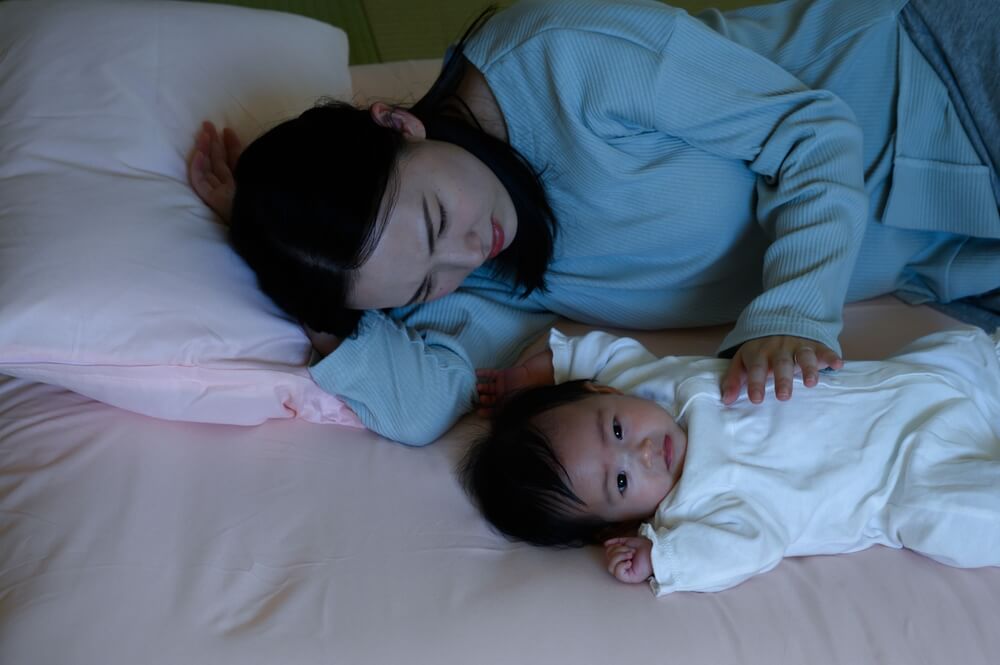When Dreams Disrupt: Decoding Sleep Regression in Babies

Are you a new parent who thought you had finally cracked the code to your baby’s sleep routine… only to suddenly find yourself in the middle of a baby sleep regression?
Don’t panic—you’re not alone! When your little one reaches certain ages and stages, they may experience disruptions in their sleep patterns that can leave you feeling exhausted and frustrated.
Ready to get some rest? We’ve got you covered with all the need-to-know information on baby sleep regression and how to survive it.
Contents:
- What is Sleep Regression?
- What Are the Signs of Sleep Regression?
- Sleep Regression: Stage by Stage
- Tips to Handle Your Baby’s Sleep Regressions
- Key Takeaways
- FAQ
What is Sleep Regression?

Da Antipina/Shutterstock.com
Let’s talk about sleep regression—a phenomenon that every parent dreads but is unfortunately inevitable. This is when your little angel, who was sleeping soundly through the night, suddenly starts waking up more frequently and has trouble falling asleep.
You aren’t being cursed by a bad sleeper and this isn’t a phenomenon that will last forever. Relax.
Essentially, a sleep regression is just any time your baby’s sleep patterns change, causing them to wake up more often or have trouble falling asleep.
It typically happens first around the four-month mark, when your baby experiences a growth spurt, and again at around eight to ten months when they start crawling or walking.
It’s worth noting that sleep regression doesn’t happen linearly—your baby may experience it earlier or later than expected, and it may be more severe or mild.
What Causes Sleep Regression in Babies?

LeManna/Shutterstock.com
Now, what causes sleep regression in babies? There are a few different factors at play here.
- First, during a growth spurt, your baby’s body is growing rapidly, which can disrupt their normal sleep patterns.
- Also, starting at around eight months, your baby may begin to experience separation anxiety, which can make it difficult for them to fall asleep without you nearby.
- And finally, changes in routine or environment—such as a vacation or a move—can throw off your baby’s sleep schedule.
It’s important to remember that sleep regression is a normal part of baby development, so don’t beat yourself up if it happens to your little one.
There are countless other factors that can lead to sleep regression in babies and toddlers, too, from sickness to teething and even developmental leaps. All of these might seem like minor changes, but to your baby, they’re big adjustments—and they’re going to be awake much more at night as they get used to these shifts.
Do All Babies Have Sleep Regressions?
Now, you might be wondering if all babies go through sleep regressions. The short answer is no, not all babies do—and every baby will be different in terms of when they experience them.
Some babies will experience minor disruptions to their sleep patterns, while others may have more severe regressions that last for weeks or even months. It’s impossible to predict how your baby will react, so it’s best to be prepared for the worst and hope for the best.
How Long Do Sleep Regressions Last?
Again, this can vary from baby to baby, but most regressions last around two to six weeks. This can seem like ages, especially if your baby is one of the unlucky few that’s prone to lots of baby sleep regressions. It can seem like you’re stuck in a never ending cycle of sleep disturbances and middle of the night wakings!
But it’s important to remember that this too shall pass and that your baby will eventually return to their normal sleep patterns. In the meantime, try to establish a bedtime routine and stick to it as much as possible. This can help your baby feel more secure and give them a sense of structure during this confusing time.
What Are the Signs of Sleep Regression?

klioli/Shutterstock.com
So how do you know if it’s actually a sleep regression you’re dealing with—or if it’s something else entirely to blame for your little one’s nighttime alertness (and your dark circles)?
To recap, sleep regression is a temporary disruption in sleep patterns that can happen when a child reaches a certain developmental milestone or goes through a significant life change. It’s frustrating for parents, but it’s completely normal and usually resolves on its own in a few weeks.
Fighting sleep regression is likely a futile process—there’s not much you can do as a parent to prevent it. But here are some telltale signs to watch out for:
- More frequent wake-ups: If your baby or child starts waking up more often in the night than usual, this might be a sign of sleep regression. They may also have difficulty settling back to sleep, which can be exhausting for everyone involved.
- Changes in nap patterns: Sleep regression can also affect daytime naps. Your child may start napping for shorter periods or refusing to nap altogether. This can make them more irritable and overtired.
- Increased fussiness: If your child seems more cranky and irritable than usual, they may be experiencing sleep regression. It’s not uncommon for them to be more difficult to soothe and comfort during these periods of disrupted sleep.
- Regression in other areas: Sleep regression can sometimes be accompanied by other developmental regressions, such as a loss of language skills or newfound separation anxiety. This is because the same developmental leaps that disrupt sleep can also affect other areas of a child’s development. The good news? This is usually only temporary.
- Restless sleep: During sleep regression, your child may toss and turn more than usual. They may also wake up more frequently in an agitated state rather than just needing a feed or nappy change.
Read also: Help! My Baby Won’t Sleep. What Should I Do?
Sleep Regression: Stage by Stage

polkadot_photo/Shutterstock.com
There’s nothing quite like the exhaustion that comes from having a baby who won’t sleep. Just when you think you’ve got the whole sleep thing figured out, boom—your little angel becomes a sleep monster. It’s enough to make even the most patient parent want to pull their hair out.
The saying is that misery loves company—and while this won’t necessarily solve your sleepless nights, it may be comforting to know that sleep regressions are totally normal and almost every parent will go through the same thing.
Here are some sleep regression stages to watch out for.
Four Month Infant Sleep Regression

Ana Sha/Shutterstock.com
First up, we have the 4-month sleep regression.
Out of all the sleep regressions, this is the big one. Around the age of four months, your baby’s sleep patterns undergo a major change. Previously, your little one was likely sleeping in long chunks through the night. Suddenly, they start waking up more frequently—sometimes every hour or two.
The four-month sleep regression is thought to be caused by changes in your baby’s brain development, as well as their physical growth. They might be learning to roll over and they’re also finally starting to adjust their natural rhythms to more “normal” sleep cycles.
They’re gradually abandoning the habit of sleeping all day as a newborn and beginning to adjust to sleeping more at night (though it certainly won’t seem like it at first!).
Eight Month Regression

ANRproduction/Shutterstock.com
Next, we have the eight to ten-month sleep regression. This one can be especially frustrating because it often coincides with your baby learning to crawl and pull themselves up. Just when you thought you had baby-proofed everything, your little Houdini finds a way to get themselves into trouble.
During this stage, your baby may struggle to fall asleep, or they may start waking up more frequently during the night. Some babies may even start refusing naps. It’s exhausting, but rest assured that it’s temporary.
12 Month Sleep Regression

Igor Stepovik/Shutterstock.com
The 12-month sleep regression is the next stage. By this point, your baby is likely walking and talking, and their brain is developing rapidly. This can lead to some disruptions in their sleep patterns.
Your little one may start waking up more frequently, or they may start having trouble falling asleep. Some parents report that their baby starts having nightmares at this stage, which can make bedtime even more of a struggle.
The Toddler Sleep Regression

Ozgur Coskun/Shutterstock.com
Last but not least, we have the 18-month sleep regression. This one is a doozy. Around 18 months, your baby is starting to become a toddler, with all the joy and frustration that entails. They may start showing some signs of independence, which can be both exciting and terrifying.
During this stage, your little one may start experiencing separation anxiety, which can make bedtime a nightmare. They may also start refusing naps altogether, even though they still clearly need sleep.
Related: Toddler Night Terrors: Causes, Symptoms, and Treatments.
Tips to Handle Your Baby’s Sleep Regressions

Trendsetter Images/Shutterstock.com
First and foremost, understand that sleep regressions are a natural part of a baby’s development. They happen at specific stages when your baby’s brain is going through significant changes. These changes could be physical, such as teething or growth spurts, or cognitive, where babies are learning new skills like crawling or standing.
Now, on to the more practical advice.
Maintain a Consistent Sleep Routine
One of the most effective things you can do to help your baby through a regression is to maintain a consistent sleep routine. It’s crucial to stick to a regular bedtime, wake-up time, and nap schedule.
This practice helps your baby learn when it’s time for sleep and builds rhythm for their body clock. If they have a stable sleep routine, your baby’s body will know when it’s time to shut down for the night.
Related: Unlocking Restful Nights: A Guide to the Ferber Method of Sleep Training.
Create the Ideal Environment

Aleksei Mikhailechko/Shutterstock.com
Another tip is to be aware of your baby’s surroundings. Dark, quiet, and cool environments are the perfect conditions for sleep. These factors can help your baby feel more comfortable, relaxed, and ready for a peaceful slumber. So, if your baby’s nightlight is too bright or the room is too hot, it’s time to make some adjustments.
Adjust the Feeding Schedule
In some cases, sleep regressions are a result of your baby’s feeding schedule. A hungry baby is an unhappy baby, so it’s essential to make sure you are feeding your little one adequately.
If your baby is waking up multiple times a night, try to feed them more during the day so they don’t need as much at night. You can also try adding a dream feed before you go to bed. A dream feed involves feeding your baby while they’re still asleep—this could potentially help them sleep for longer periods.
Stay Calm and Give Yourself Grace

kapinon.stuio/Shutterstock.com
It’s also worth noting that babies can pick up on their parent’s anxiety and stress. It’s tough to maintain a cool and calm demeanor when you’re dealing with a fussy baby, but it’s necessary to keep your stress levels down.
A relaxed parent is more likely to have a relaxed baby. Take some time to relax, breathe, and take care of yourself—that way, you can be the best parent possible for your little one.
Finally, remember that sleep regression doesn’t last forever. These phases can last between two to six weeks, and your baby will go back to their regular sleeping habits. As long as you stay patient, consistent, and take care of yourself, you and your baby will breeze through this phase.
Sleep regression can be challenging. Throughout your child’s growing up, you will face difficulties and experiences more than once. Keep your child safe at all times and in all circumstances with the Findmykids app!
Key Takeaways

Nina Buday/Shutterstock.com
Hopefully, this article has been helpful in illuminating the murky waters of sleep regression stages. Every child experiences it differently, but one thing is for sure—it’s tough on everyone involved.
Our top advice to parents is to remain patient, be understanding, and always remember that this too shall pass. Consistency is key, and with time, you and your little one will emerge on the other side feeling well-rested and rejuvenated.
So, to all the sleep-deprived parents out there, don’t lose hope! Keep calm and carry on, and know that you’re not alone in this struggle.
Share your experiences, vent out your frustrations, and connect with other parents who are in the same boat. We’re all on this journey together, and with a little bit of effort, we can all survive and thrive through sleep regression ages and stages.
FAQ

Ground Picture/Shutterstock.com
How do I know if my baby is having a sleep regression?
One sign to look for is if your baby starts waking up more frequently at night, or struggles to fall asleep for longer periods of time. This can be due to developmental changes, growth spurts, or other factors.
Can 3-year-olds go through sleep regression?
Children of all ages, including those that are three years old or even older, can experience sleep regressions, though they become less common as kids get older. You should find them dropping off around 18 months and becoming more sparse as your child is sleeping consistently through the night.
Should I feed the baby during sleep regression?
As always, follow your baby’s hunger cues and make sure they’re getting the necessary nutrients. However, if you suspect that the sleep regression is due to your baby simply wanting to snack all night long, it may be time to try and break that habit gently.
What is the 4-week sleep regression?
This is a time when your baby’s sleep patterns change as they go through a major cognitive and developmental phase.
The picture on the front page: Irina Wilhauk/Shutterstock.com
Проверьте электронный ящик



















